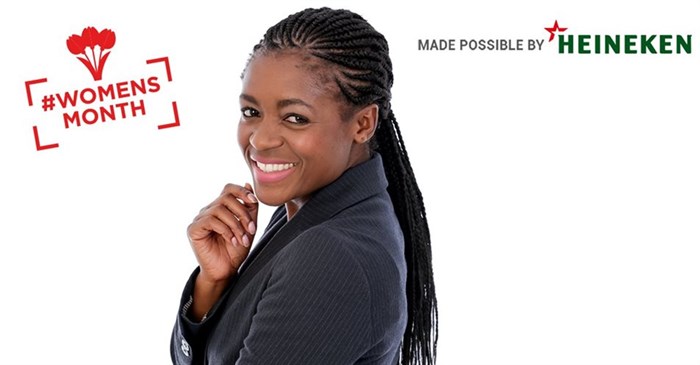Corporate Affairs Director of Heineken South Africa Millicent Maroga shares her thoughts on female leadership and empowering women entrepreneurs, some of the challenges women in the industry face, as well as GBV.
Can you tell us a bit about yourself?
I grew up in Daveyton, which is a township in the Ekurhuleni Metropolitan Municipality of Gauteng in South Africa. Its claim to fame other than being the home of jazz thanks to stars like Ray Phiri and more recently Lerato ‘Lira’ Molapo, is being the first township to have electricity, which is why its affectionately known by the nickname Vutha that means light or to burn. My dad works in the taxi industry and mom is a real township entrepreneur. I am the second born of five siblings.
You're the Corporate Affairs Director of Heineken South Africa. Tell us more about your role here.
I lead the Corporate Affairs agenda and I am responsible for Heineken South Africa's relationship with governmental- legislative- and other stakeholders. Additionally, I drive the business's sustainability agenda to Brew A Better World, and build its reputation as a dedicated partner for South Africa. I also drive Heineken's internal communication and employee engagement initiatives.
Do you have any role models? If so, who?
Other than my mom, I have a lot of respect for and for her work in the informal economy, I also respect the so-called ‘shebeen queens’ or hard-working female-owned taverns, who not only operate thriving businesses employing numerous community members, but in periods of crisis like these, they are usually the ones who run food kitchens to help feed the community and support where they can. These women are often the ones you can turn to in times of need and support the community a great deal.
In my career I have also looked up to the women I reported into including Bongiwe Njobe – my former manager at SAB and Sarah Mthintso – my former manager at Old Mutual.
You have a successful career spanning over 15 years. Tell us about your journey.
I started my career in the NGO sector as a junior researcher focusing on the criminal justice sector. I left the sector to study for my Masters degree full time in Globalisation and Development degree. Whilst I was studying I had an opportunity to interview with SAB and Unilever and initially opted for Unilever and before I could start with them, I decided to join SAB. I worked for SAB in various roles, the last of which was Corporate Affairs Manager. I also completed a three-and-a-half-year stint at Old Mutual as Head of the Old Mutual Foundation, before joining Heineken SA as Corporate Affairs Director nearly two years ago.
Are South African women getting enough of a chance to shine in the brewing/alcohol industry?
Certainly, while beer is often thought of as a man’s drink, made by a male-dominated industry, this is changing, especially in South Africa.
If you simply Google ‘South African beer industry’ and ‘women’, you’ll see some interesting results. There’s a lot of talk about women brewmasters getting their place in the sun, or female marketers helping brands evolve to suit a changing market demographic – but where women are making the biggest difference is in the leadership arena. This is certainly true at Heineken South Africa, where half of the management team is female; a dynamic also reflected within the leadership of The Beer Association of South Africa (BASA) and even our competitors.
Could you list a few, if any, specific challenges females face in this industry? How do women overcome these challenges?
Some of the policies might not be taking into account the needs of working women, especially mothers and the commitments they have with regards to their families. This is changing and as a result of the lockdown, many people of working from home and consequently, getting a front row seat and personal experience with regards to those challenges.
There might be occasions where your age may be seen as a negative with the comment “you’re so young”, implying that you might be too inexperienced to handle the responsibilities of the position or even worse don’t deserve it as yet. Here, I let my results speak for me and quickly disprove those notions.
You're a successful businesswoman. How do you keep a work-life balance?
With the help of a phenomenal woman behind me, namely my helper and my support base- my mother, my sister and my neighbour who we support each other in raising our boys.
What can governments do to help drive female leadership in SA?
We need to extend our focus from not only creating policies but creating an enabling environment for women to take up leadership roles in all spheres of society- this includes ensuring that we create a flexible working environment for women.
How is Heineken empowering women entrepreneurs in building successful businesses?
Heineken SA has supported 150 small businesses through its entrepreneur-focused programmes, namely Orange Corners and Green Seeds. Orange Corners South Africa is a Jozi-based business incubator, which empowers startups to accelerate the growth of their businesses through amongst others items, the delivery of physical workspaces, training and mentorship as well as business coaching.
Through our Green Seeds enterprise development initiative, Heineken supports small, micro and medium enterprises in the Gauteng province by providing mentorship and masterclass sessions with relevant experts, who cover important business topics that will help position these companies better for their current sustainability and future success.
In our own industry, entrepreneurial women-owned taverns account for 54% of tavern ownership. Many have been without an income for months because of the imposed ban on alcohol sales. It is estimated that 3 out of 5 taverns and restaurants would have shut down by last month, wherever possible we’ve put in place systems and tools and hygiene measures for these taverns to operate as off- premises consumption points to allow their businesses to run when alcohol is permitted.
Lastly, this month, in collaboration with Bizcommunity we are profiling the phenomenal work and impact of some female entrepreneurs. The series will be published on Bizcommunity during the month of August. Additionally, the entrepreneurs will each receive a complementary online advertising package to promote their businesses.
How do you think South Africa can help in the fight against GBV?
As an industry, we believe any intervention aimed at addressing gender base violence must not ONLY focus on the abuse of alcohol, but also on the other systemic root causes that give rise to - and sustain these social ills. Many of these start at a young age, when young boys are allowed to make girls feel uncomfortable from cat-calling and whistling, to harassing girls to get their attention at the corner cafe, when this is not discouraged at a young age this behaviour continue into adulthood when this lack of respect for women and hostile attitude is difficult to change.
Gender-based violence (GBV) is a widespread problem in South Africa, which is normalised and underreported. South Africa is listed as one of the countries in the world with the highest levels of GBV, with domestic violence and intimate partner violence (IPV) being the forms of GBV that are most prevalent locally. GBV in South Africa is fuelled by a number of societal factors including poverty, socio-economic inequality between men and women; and cultural attitudes, which still regard women as subordinates to men. Additionally, individual factors also play a role and these include family history of violence; as well as alcohol and substance abuse amongst others.
What advice do you have to share with the future generation of businesswomen?
There is still a need to have more female representative at managerial level and in the boardroom. Also, you should have a mentor and a sponsor – who is someone who can speak for you, especially when you are not in the room.
For companies; appointments aren’t enough, you should also help create a psoitive environment for the women you appoint in which their opinions and contributions are respected and asked for. Essentially, yes women should have a seat at the table but we must make sure the chair suit the woman and is comfortable, so to speak, and allows women the space, comfort and respect to do their job while balance their other commitments.
As we celebrate Women's Month in South Africa. Do you have any words of encouragement for all the women out there?
Your voice, skills and contributions matter. You are not there simply to make up the numbers, you have a valuable contribution to make so don’t be afraid to speak up, make your voice heard, be opinionated and confident. Let your work speak for itself.
























































